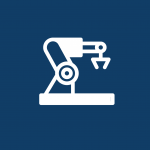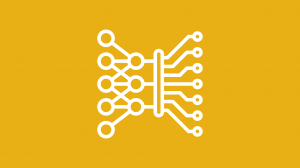ROBOTICS
Robotics is the quintessence of Automation Science and Engineering, placed at the nexus of mathematics, physics, mechanics, and computer science. Without losing the broad perspective competence that characterizes the degree in Control Systems Engineering, the Robotics path is designed around the backbone of “Robotics and Control I-II”, to guide the student through a powerful blend of methodological and application-oriented topics. These subjects are well supported and intermingled with classes on computational vision and optimization theory, two disciplines that have become fundamental for modern engineering. The proposed ancillary subjects will complement and strengthen the student skills in the automation field to deal with all forms of systems be they industrial, mobile, networked.
Mandatory subjects
Linear systems theory is the cornerstone of control theory and a well-established discipline that focuses on linear state-space models from the perspective of control and estimation. In this course we investigate fundamental properties, as controllability and observability, and show how these properties play a preminent role in the design of state feedback controllers and state observers. The solution of the Linear Quadratic optimal control problem concludes the course.
Continuous-time systems are nowadays controlled by means of digital controllers. The course deals with both coupling digital systems and analogue ones and analyzing how this coupling affects tte controller design.
Machine learning, now pervading our daily life, is at the core of modern autonomous systems. You will learn the art and science of automatically learning from experience extracting information from measured data.
In this course, you will see control systems “in action”. A wide set of design and tuning techniques are reviewed and applied in our laboratory. In particular, frequency domain and state-space control methods for robust reference tracking are tested on a DC motor, a flexible joint and a balancing robot.
The capability of reconstructing the state of a dynamic system from output data is key in many control and decision problems. The course will describe fundamental techniques for off- and on-line state estimation including Kalman filter, Markov chain Monte Carlo and particle filters.
This course provides an introduction to convex optimization, starting from the basic foundational concepts (convex set and functions, duality theory and optimality conditions) and then delving into established mature technologies like gradient methods and linear programming. We will finally move into combinatorial optimization with mixed integer programming.
The course provides the main mathematical competencies in the field of robotics. The main topics addressed in the course are basic concepts of robotics (kinematic and dynamic models), illustration of advanced control schemes for position and force control of robot manipulators (robust control, adaptive control, learning control, impedance and force control)
The computer vision courses presents the principles and techniques for image processing, understanding and analysis. The course will show how to extract relevant information from visual data that can be used in challenging real world applications like autonomus driving or smart manifacturing. It presents the mathematical, programming, and technical issues of these tasks and will include a relevant hands-on laboratory part where students will also develop C++ applications based on the OpenCV library.
Robotics and Control II will guide you through the modern world of multiagent systems and mobile robotics, such as multicamera networks, ground vehicles and aerial platforms. Starting from the foundational sensing and actuation problems, you will study canonical tasks as those of localization, motion planning, formation control, resilient coverage.
Elective subjects
The course will provide competences on robotics vision, autonomous robotics systems, algorithms for planning and collision avoidance, cloud computing and semantic networks for robotics. In the course students will be taught on how to program autonomous and collaborative robots, multi-link systems and artificial intelligent-based systems.
The course introduces the most popular data-driven techniques to construct dynamical systems by means of statistical as well as machine learning methods and their application to various engineering design problems. The course includes 6 Matlab laboratories.
The course will provide the student with the ability to develop robotics applications in the industrial sector. Models that define complex mechanical systems, equipped with open kinematic chain (manipulating robots), used in industrial robotics applications will be studied. The problems of designing and choosing of the main components for a robotic cell and automated lines for industrial use will be analyzed, learning to use the typical commands of the programming languages of industrial robots.
This course provides the tools for the analysis of dynamical interconnected network systems and their application to various engineering design problems. Various important examples are proposed such as consensus dynamics and averaging systems for distributed optimization, compartmental flow networks, synchronization in coupled oscillators, distributed control of power grids and network models for ecology and epidemiology.
This course provides an overview of nonlinear system analysis and control methods, including advanced Lyapunov stability and stabilization, nonlinear controllability and feedback linearization.
The course provides fundamentals on electric drives theory as well as insights on the design and implementation of their control system with reference to innovative solutions (sensorless control, predictive control, …) and to emerging applications (electric vehicles, energy, …).
The course will provide theoretical and practical knowledge in the art of designing and implementing Digital Control Systems able to meet hard Real-Time requirements, with focus on Embedded applications. Lab experiences will show the entire Model-Based-Design workflow for the development of Embedded Real-Time Control systems
Reinforcement Learning is a subfield of Machine Learning and Control, where multistage decision problems are treated. This course introduces you to learning techniques where an agent explicitly takes actions and interacts with the world.
Acquisition of information from the empirical world and the analysis of information quality is illustrated. The proposed laboratory activities provide a learning opportunity on the design of measurement applications based on commercial devices.
With the Robotics Laboratory classes, you will learn how to master your knowledge leveraging the methodological aspects studied along the whole CSE degree towards the realization of robotics systems. Robotic arms and mobile multi-robot systems will be in the course focus and both realistic multi-physics simulator design and actual physical systems design are envisaged.
MACHINE LEARNING
Modern automation is facing exciting challenges, such as self-driving cars and human-robot interaction that quest for an unprecedented amount of flexibility, adaptability and robustness that has never been, to this extent, required to classical control systems. The novel ingredient is the abundance of data that have made the so called data scientist one of the most required professions in the job market. Machine Learning, indeed, is the art and science of getting machines to learn from data and act without being specifically programmed. This CSE Machine Learning curriculum is designed to provide knowledge and tools that merge fundamental principles of control systems design and real-time estimation with state-of-the-art machine learning and optimization, in close connection with several application domains such as robotics and computer vision.
Mandatory subjects
Linear systems theory is the cornerstone of control theory and a well-established discipline that focuses on linear state-space models from the perspective of control and estimation. In this course we investigate fundamental properties, as controllability and observability, and show how these properties play a preminent role in the design of state feedback controllers and state observers. The solution of the Linear Quadratic optimal control problem concludes the course.
Continuous-time systems are nowadays controlled by means of digital controllers. The course deals with both coupling digital systems and analogue ones and analyzing how this coupling affects the controller design
Machine learning, now pervading our daily life, is at the core of modern autonomous systems. You will learn the art and science of automatically learning from experience extracting information from measured data.
In this course, you will see control systems “in action”. A wide set of design and tuning techniques are reviewed and applied in our laboratory. In particular, frequency domain and state-space control methods for robust reference tracking are tested on a DC motor, a flexible joint and a balancing robot.
The capability of reconstructing the state of a dynamic system from output data is key in many control and decision problems. The course will describe fundamental techniques for off- and on-line state estimation including Kalman filter, Markov chain Monte Carlo and particle filters.
This course provides an introduction to convex optimization, starting from the basic foundational concepts (convex set and functions, duality theory and optimality conditions) and then delving into established mature technologies like gradient methods and linear programming. We will finally move into combinatorial optimization with mixed integer programming.
The computer vision courses presents the principles and techniques for image processing, understanding and analysis. The course will show how to extract relevant information from visual data that can be used in challenging real world applications like autonomus driving or smart manifacturing. It presents the mathematical, programming, and technical issues of these tasks and will include a relevant hands-on laboratory part where students will also develop C++ applications based on the OpenCV library.
The course introduces the most popular data-driven techniques to construct dynamical systems by means of statistical as well as machine learning methods and their application to various engineering design problems. The course includes 6 Matlab laboratories.
Reinforcement Learning is a subfield of Machine Learning and Control, where multistage decision problems are treated. This course introduces you to learning techniques where an agent explicitly takes actions and interacts with the world.
Elective subjects
The course aims at introducing advanced mathematical results and techniques for the solution of control and machine learning problems. Topics of the course include: elements of the theory of metric spaces and abstract integration, constrained finite and infinite-dimensional optimization, and maximum entropy methods.
The course provides the main mathematical competencies in the field of robotics. The main topics addressed in the course are basic concepts of robotics (kinematic and dynamic models), illustration of advanced control schemes for position and force control of robot manipulators (robust control, adaptive control, learning control, impedance and force control)
The course covers the theory and practice of modern artificial neural networks, highlighting their relevance both for machine learning applications and for modeling human cognition and brain function. Topics include single-neuron modeling and principles of neural encoding; supervised, unsupervised and reinforcement learning; feed-forward and recurrent networks; energy-based models; large-scale brain organization. Theoretical discussion of various types of network architectures and learning algorithms is complemented by hands-on practices in the computer lab (PyTorch framework).
In this course students learn fundamental algorithmic techniques for the effective and efficient processing of large datasets. Moreover, through a number of practical activities, they acquire skills regarding the development of applications in Apache Spark, which is one of the most popular and widely adopted programming frameworks for big data computing. The topics covered include clustering, association analysis, graph analytics, and similarity/diversity search.
The course will provide the student with the ability to develop advanced control systems that: 1. are able to adapt to changes in the controlled system; 2. can satisfy predefined contrains, like reaching a target state in a finite time horizon.
Game theory is the science of analyzing multi-objective multi-agent problems (i.e., “games”). This involves the games we usually play for fun in our everyday life, but in a more serious context is applied to resource competition, distributed management, efficient allocation over multi-user systems and/or communication networks. This course teaches all the basic concepts, as well as some advanced ones, of game theory. Also, it applies them to scenarios of interest for ICT.
The course will provide theoretical and practical knowledge in the art of designing and implementing Digital Control Systems able to meet hard Real-Time requirements, with focus on Embedded applications. Lab experiences will show the entire Model-Based-Design workflow for the development of Embedded Real-Time Control systems
Acquisition of information from the empirical world and the analysis of information quality is illustrated. The proposed laboratory activities provide a learning opportunity on the design of measurement applications based on commercial devices.
This course provides the tools for the analysis of dynamical interconnected network systems and their application to various engineering design problems. Various important examples are proposed such as consensus dynamics and averaging systems for distributed optimization, compartmental flow networks, synchronization in coupled oscillators, distributed control of power grids and network models for ecology and epidemiology.
INDUSTRIAL AUTOMATION
Control Systems Engineering has traditionally been the shoulder of the industry: being pervasive in all processes and systems, CSE has consolidated its key role as a non-invasive enabling technology. But to enter the Fourth Industrial revolution and master its challenges, the modern industry has to leverage the information and control approach at a higher level. In this spirit, the brand-new Industrial program wants to conjugate the solid methodological content of Automation science with the cross disciplinary topics of Optimization, Industrial Communication, Real Time Systems to provide tools and methods to manage complex industrial machines, IOT platforms, Cyber Physical Systems, as well as to address the digitalization of products and services and data intelligence. The study program is then completed with robotics, vision, learning at various level to enrich the competences with balanced theoretical-applicative flavors.
Mandatory subjects
Linear systems theory is the cornerstone of control theory and a well-established discipline that focuses on linear state-space models from the perspective of control and estimation. In this course we investigate fundamental properties, as controllability and observability, and show how these properties play a preminent role in the design of state feedback controllers and state observers. The solution of the Linear Quadratic optimal control problem concludes the course.
Continuous-time systems are nowadays controlled by means of digital controllers. The course deals with both coupling digital systems and analogue ones and analyzing how this coupling affects the controller design.
Machine learning, now pervading our daily life, is at the core of modern autonomous systems. You will learn the art and science of automatically learning from experience extracting information from measured data.
In this course, you will see control systems “in action”. A wide set of design and tuning techniques are reviewed and applied in our laboratory. In particular, frequency domain and state-space control methods for robust reference tracking are tested on a DC motor, a flexible joint and a balancing robot.
The capability of reconstructing the state of a dynamic system from output data is key in many control and decision problems. The course will describe fundamental techniques for off- and on-line state estimation including Kalman filter, Markov chain Monte Carlo and particle filters.
This course provides an introduction to convex optimization, starting from the basic foundational concepts (convex set and functions, duality theory and optimality conditions) and then delving into established mature technologies like gradient methods and linear programming. We will finally move into combinatorial optimization with mixed integer programming.
The course will provide theoretical and practical knowledge in the art of designing and implementing Digital Control Systems able to meet hard Real-Time requirements, with focus on Embedded applications. Lab experiences will show the entire Model-Based-Design workflow for the development of Embedded Real-Time Control systems
Architecture and components of industrial automation systems: controllers, communication networks, sensors/actuators and supervisory systems. Controllers: architecture, operation and programming; description of programming languages compliant with the international standard IEC 61131-3; examples of implementation of automation tasks; data exchange with sensors/actuators. Communication networks for automation: architecture and protocols; connection with sensors/actuators and with supervisory systems.
The course provides fundamentals on electric drives theory as well as insights on the design and implementation of their control system with reference to innovative solutions (sensorless control, predictive control, …) and to emerging applications (electric vehicles, energy, …).
Elective subjects
The course introduces the most popular data-driven techniques to construct dynamical systems by means of statistical as well as machine learning methods and their application to various engineering design problems. The course includes 6 Matlab laboratories.
The course provides the main mathematical competencies in the field of robotics. The main topics addressed in the course are basic concepts of robotics (kinematic and dynamic models), illustration of advanced control schemes for position and force control of robot manipulators (robust control, adaptive control, learning control, impedance and force control)
The computer vision courses presents the principles and techniques for image processing, understanding and analysis. The course will show how to extract relevant information from visual data that can be used in challenging real world applications like autonomus driving or smart manifacturing. It presents the mathematical, programming, and technical issues of these tasks and will include a relevant hands-on laboratory part where students will also develop C++ applications based on the OpenCV library.
The course will provide the student with the ability to develop robotics applications in the industrial sector. Models that define complex mechanical systems, equipped with open kinematic chain (manipulating robots), used in industrial robotics applications will be studied. The problems of designing and choosing of the main components for a robotic cell and automated lines for industrial use will be analyzed, learning to use the typical commands of the programming languages of industrial robots.
The course will provide the student with the ability to develop advanced control systems that: 1. are able to adapt to changes in the controlled system; 2. can satisfy predefined contrains, like reaching a target state in a finite time horizon.
The computer vision courses presents the principles and techniques for image processing, understanding and analysis. The course will show how to extract relevant information from visual data that can be used in challenging real world applications like autonomus driving or smart manifacturing. It presents the mathematical, programming, and technical issues of these tasks and will include a relevant hands-on laboratory part where students will also develop C++ applications based on the OpenCV library.
The course exploits basic signal analysis knowledge that the student is assumed to have acquired from previous studies to explore advanced concepts in the field of digital signal processing. The course will review Z-transform, linear time-invariant systems, FIR/IIR filters, to investigate the design and usage of digital filters, interpolation/decimation of digital signals, frequency analysis of digital signals. Practical application examples, useful in many areas of information engineering, will be provided.
This course provides the tools for the analysis of dynamical interconnected network systems and their application to various engineering design problems. Various important examples are proposed such as consensus dynamics and averaging systems for distributed optimization, compartmental flow networks, synchronization in coupled oscillators, distributed control of power grids and network models for ecology and epidemiology.
In modern communication systems, securing against malicious behavior is a primary issue, and must be part of the design since the beginning, rather than a patch added as a belated measure. The class introduces fundamental notions and tools in information security, with a focus on the solutions, attacks, and countermeasures that can be deployed at the different layers in modern communication networks. The students will be asked to apply their acquired knowledge to practical use cases, industrial standards, and experimental scenarios.
Reinforcement Learning is a subfield of Machine Learning and Control, where multistage decision problems are treated. This course introduces you to learning techniques where an agent explicitly takes actions and interacts with the world.
The course will provide competences on robotics vision, autonomous robotics systems, algorithms for planning and collision avoidance, cloud computing and semantic networks for robotics. In the course students will be taught on how to program autonomous and collaborative robots, multi-link systems and artificial intelligent-based systems.
Acquisition of information from the empirical world and the analysis of information quality is illustrated. The proposed laboratory activities provide a learning opportunity on the design of measurement applications based on commercial devices.
COMPLEX SYSTEMS
As our world becomes more complex and interconnected, modern societies are producing an unprecedented amount of raw data. Extracting and using information from these data is therefore the real challenge of modern Engineering. The aim of the “Complex Systems” path is to provide the students with systems and control theory tools to extract information from data and harness complexity. This program embodies the teaching of Galileo Galilei who realized that “Nature’s great book is written in mathematical language”. Among the key courses of this path are optimization and computation theories that bring Galileo’s teaching to the next level: mathematical models for complex systems. Once it is captured by a suitable mathematical model, complexity is tamed and ready to be governed with control techniques that are the core of several courses in this path.
Mandatory subjects
Linear systems theory is the cornerstone of control theory and a well-established discipline that focuses on linear state-space models from the perspective of control and estimation. In this course we investigate fundamental properties, as controllability and observability, and show how these properties play a preminent role in the design of state feedback controllers and state observers. The solution of the Linear Quadratic optimal control problem concludes the course.
Continuous-time systems are nowadays controlled by means of digital controllers. The course deals with both coupling digital systems and analogue ones and analyzing how this coupling affects the controller design.
Machine learning, now pervading our daily life, is at the core of modern autonomous systems. You will learn the art and science of automatically learning from experience extracting information from measured data.
In this course, you will see control systems “in action”. A wide set of design and tuning techniques are reviewed and applied in our laboratory. In particular, frequency domain and state-space control methods for robust reference tracking are tested on a DC motor, a flexible joint and a balancing robot.
The capability of reconstructing the state of a dynamic system from output data is key in many control and decision problems. The course will describe fundamental techniques for off- and on-line state estimation including Kalman filter, Markov chain Monte Carlo and particle filters.
The course focuses on qualitative analysis of dynamics, Lagrangian mechanics and some basic concepts of calculus of variations. The aim is to approach a physical model with rigorous mathematical formalism.
The course aims at introducing advanced mathematical results and techniques for the solution of control and machine learning problems. Topics of the course include: elements of the theory of metric spaces and abstract integration, constrained finite and infinite-dimensional optimization, and maximum entropy methods.
The course introduces the most popular data-driven techniques to construct dynamical systems by means of statistical as well as machine learning methods and their application to various engineering design problems. The course includes 6 Matlab laboratories.
Elective subjects
The course provides the main mathematical competencies in the field of robotics. The main topics addressed in the course are basic concepts of robotics (kinematic and dynamic models), illustration of advanced control schemes for position and force control of robot manipulators (robust control, adaptive control, learning control, impedance and force control)
The aim of the course is to introduce the most common formal models of computation. The course will survey basic notions of models and resources of computation, the concept of formal language, and the notions of computability, decidability, and tractability of a problem.
The course provides a series of tools from dynamical systems theory and feedback control systems to model, understand and analyze the core elements of cell dynamics and to design new synthetic circuits. Specifically, it will start from basic chemical reactions, transcription and translation mechanisms and will describe more complex biochemical cell circuits and motifs.
Game theory is the science of analyzing multi-objective multi-agent problems (i.e., “games”). This involves the games we usually play for fun in our everyday life, but in a more serious context is applied to resource competition, distributed management, efficient allocation over multi-user systems and/or communication networks. This course teaches all the basic concepts, as well as some advanced ones, of game theory. Also, it applies them to scenarios of interest for ICT.
Besides its tremendous advancements in physics, quantum theory is also expected to revolutionize classical information theory based on 0/1 bits and also how we compute and handle information. In this spirit, this course will discuss quantum principles such as quantum logic and the qubit, no-cloning theorem, quantum copying, quantum entanglement, quantum teleportation, quantum key distribution, quantum information and entropy measures, quantum computing algorithms.
The course will cover modeling methodologies for biological systems. These comprise the formulation, identification, and validation of a model in relation to the objective of the modeling process. The course will also survey control principles applied to biological systems.
This course provides the tools for the analysis of dynamical interconnected network systems and their application to various engineering design problems. Various important examples are proposed such as consensus dynamics and averaging systems for distributed optimization, compartmental flow networks, synchronization in coupled oscillators, distributed control of power grids and network models for ecology and epidemiology.
This is a theoretical course intended to provide knowledge of the main mathematical tools and modeling techniques for the study of telecommunication networks and networking protocols. The students will get to know the theoretical basics of Markov chains, renewal processes, queueing theory and traffic models. These instruments will be further applied to the analysis of datalink and networking protocols.
Acquisition of information from the empirical world and the analysis of information quality is illustrated. The proposed laboratory activities provide a learning opportunity on the design of measurement applications based on commercial devices.
The course focuses on the analysis and design of smart electric networks (smart grids, microgrids, and nanogrids), containing distributed generators driven by renewable sources and connected to the network through electronic power converters.
The course aims at providing fundamental deterministic and stochastic models for population dynamics and for epidemic diffusion. In particular, the dynamics of a single isolated population, of two populations of preys and predators, or of populations competing for a common resource will be investigated. Stochastic death and birth models will be presented. Classical SI, SIS, and SIR models will be presented for epidemic diffusion, and the effects of vaccination will be accounted for.
The aim of this course is to introduce some of the basic computational problems and tasks in learning from networked data, as well as to introduce the most common algorithms for such tasks. Both supervised and unsupervised techniques will be covered: graph/network analytics, feature extraction from networked data, finding significant patterns in networked data.
An overview of nonlinear system analysis and control, including advanced Lyapunov stability and stabilization, nonlinear controllability and feedback linearization methods.




